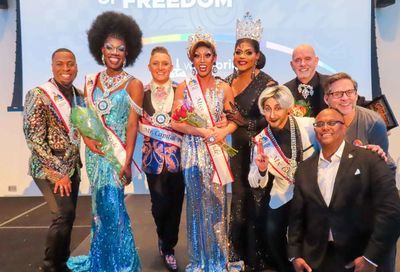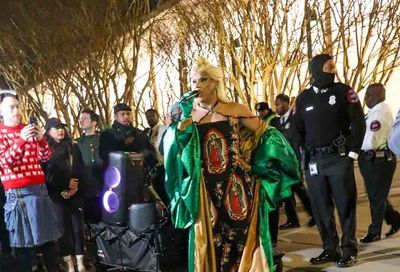Romney Taps Ryan
Anti-gay positions enforced with Wisconsin rep. as vp pick

At a morning rally Aug. 11 in Virginia, presumptive Republican presidential nominee Mitt Romney introduced Wisconsin Rep. Paul Ryan as his vice presidential running mate.
It seemed as soon as the 42-year-old Ryan emerged from the retired battleship Wisconsin docked behind the stage, new life energized a campaign that has been chugging along through the Republican primaries for more than a year.

Paul Ryan
“There are a lot of people in the other party who might disagree with Paul Ryan,” Romney said to the cheering crowd of supporters. “I don’t know of anyone who doesn’t respect his character and judgment.”
Romney’s pick signals a continued focus on jobs and the economy this presidential campaign, but also a shift in debate about the scope of the federal government. Moreover, Ryan’s selection is a reinforcement of strict conservative views on LGBT issues.
Ryan, who is 23 years younger than Romney and the same age as Romney’s oldest son, is a tea party favorite well known in Washington as a staunch fiscal conservative whose budget proposals have been characterized by Democrats as radical in nature.
Ryan’s budget plan, which would dramatically reduce the size of the federal government and overhaul entitlement programs such as Medicaid and Medicare, has made him a leading policymaker in the Republican Party.
Although Ryan’s congressional career has focused largely on economic issues, much like Romney’s presidential campaign has, he is no less of a social conservative.
Ryan came to Capitol Hill in 1999 and has accumulated a long record of voting against gay rights legislation. Indeed, Ryan voted in 2004 and 2006 for a constitutional amendment banning gay marriage. Romney himself has said he favors amending the Constitution to forbid same-sex couples’ right to marry.
Explaining his vote to amend the Constitution in 2004, Ryan said in a press release that he believes “marriage should remain between a man and a woman.”
“I had hoped that this amendment wouldn’t be necessary, but increasingly it appears that laws such as the Defense of Marriage Act will not be sufficient to protect marriage from certain courts that distort state and federal constitutional law,” Ryan added.
“Marriage is not simply a legal arrangement between individuals. The institution of marriage is an integral part of our civil society and its significance goes well beyond eligibility for benefits and similar considerations. Its future should not be left to a few overreaching judges or local officials to decide,” he said.
More recently, in 2007 Ryan voted against a bill that made sexual orientation- and gender identity-based hate crimes standalone offenses. In 2009 Ryan voted against the Matthew Shepard and James Byrd Jr. Hate Crimes Protection Act, which expanded federal hate crime laws to include attacks on the LGBT community. In 2010 Ryan voted against the repeal of “Don’t Ask, Don’t Tell.” In May, following President Barack Obama’s endorsement of marriage equality, Ryan voted for a bill that would prevent the Department of Justice from arguing against the constitutionality of the Defense of Marriage Act.
Ryan also favors a ban on same-sex couples’ ability to adopt children in D.C.
In a February appearance on Meet the Press, Ryan expressed puzzlement over why so much time was being devoted to discussing marriage equality (at the time, same-sex marriage legislation was working its way through the Maryland Legislature and President Barack Obama had yet to endorsed marriage equality).
“I don’t know why we’re spending all this time talking about this,” Ryan said of marriage equality.
Although Ryan may prefer policy debates over discussions about social issues, he is no less consistent in his opposition to issues important to the LGBT community.
According to the Human Rights Campaign’s congressional scorecard, Ryan received a 0 percent for his positions on gay-rights legislation in the 111th Congress.
Ryan now joins a presidential campaign that is more conservative on gay rights than the previous Republican president. Unlike former President George W. Bush, Romney has said he opposes civil unions “if they are identical to marriage other than by name.”
“My view is that domestic partnership benefits, hospital visitation rights and the like are appropriate, but the others are not,” Romney said in May, as reported by Denver TV station KDVR.
Despite Ryan’s anti-gay record, his selection by Romney was praised by gay conservatives.
“The selection of Paul Ryan is a bold and inspired pick,” said Jimmy LaSalvia, executive director of GOProud, which narrowly endorsed Romney earlier this summer. “Paul Ryan has been the architect of policies that would benefit all Americans, especially gay Americans.”
“Gay Americans understand that without reforms – Social Security, Medicare and Medicaid will go bankrupt. The future prosperity for all Americans, regardless of their sexual orientation, is at stake if we do not act today,” added LaSalvia, praising Ryan’s support for privatization of Social Security, which “would end the government’s discrimination against gay couples through personal savings accounts,” and his vote “to end the discriminatory death tax and for free market reforms to healthcare that will expand access to domestic partner benefits.”
In a statement, executive director of the Log Cabin Republicans, R. Clarke Cooper, praised Ryan’s 2007 vote in favor of the Employment Non-Discrimination Act and said “his consistent willingness to engage with Log Cabin on a range of issues speaks to his record as a fair-minded policymaker.”
“Overall, while Log Cabin Republicans have not completed the endorsement process for the 2012 presidential election,” Cooper said, “this is a choice that all Republicans can be excited about, and which sends a good message about the kind of campaign Governor Romney wants to run, and the kind of president Governor Romney wants to be.”
Others found Ryan’s selection less praise-worthy.
Responding to Ryan’s vote on the Employment Non-Discrimination Act, out Rep. Barney Frank (D-Mass.) said in an interview with The Advocate that Ryan voted in favor only after voting for a parliamentary motion that would have killed the bill.
”It puts to rest the notion that Romney might try to move to the center and moderate,” Frank said of Ryan’s selection, adding that he did not expect LGBT issues to feature prominently in the campaign because ”we’re winning on them.”
In a statement, HRC President Chad Griffin called Ryan out of touch on LGBT issues.
“Ryan’s record of voting against fairness, dignity and equality is out of touch with the majority of Americans and a fast growing majority of Republicans,” Griffin said. “LGBT Americans need leadership that will continue to fight for their rights to protect their families, marry the person they love, and enjoy equal protections under the law.”
Griffin’s sentiments were echoed by National Stonewall Democrats Executive Director Jerame Davis, who called Romney’s selection “as crass as it is cunning.”
“Ryan’s opposition to civil rights for LGBT people certainly matches Mitt Romney’s, but unlike Romney’s gutless pandering to the religious right, Ryan is a true believer,” Davis said in a statement. “For LGBT voters, there’s nothing in this pick but more disappointment and disregard.”
Support Metro Weekly’s Journalism
These are challenging times for news organizations. And yet it’s crucial we stay active and provide vital resources and information to both our local readers and the world. So won’t you please take a moment and consider supporting Metro Weekly with a membership? For as little as $5 a month, you can help ensure Metro Weekly magazine and MetroWeekly.com remain free, viable resources as we provide the best, most diverse, culturally-resonant LGBTQ coverage in both the D.C. region and around the world. Memberships come with exclusive perks and discounts, your own personal digital delivery of each week’s magazine (and an archive), access to our Member's Lounge when it launches this fall, and exclusive members-only items like Metro Weekly Membership Mugs and Tote Bags! Check out all our membership levels here and please join us today!



















